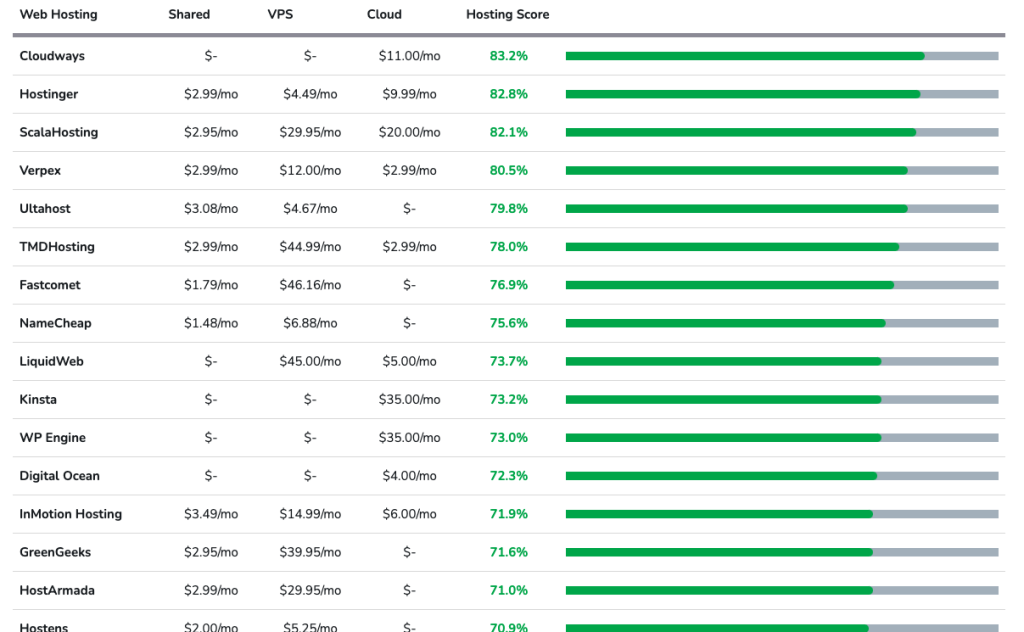Choosing the right web hosting service is essential for any website owner because it directly impacts your site’s performance, reliability, and security.
Experienced website owners typically know what to look for, but beginners might need more guidance. This guide will walk you through the key factors to consider when reviewing your web hosting options based on your specific needs.

1. Determine Your Hosting Requirements
Before you start searching for the ideal web host, it’s crucial to identify your website’s specific needs. This will help you find the best match rather than the perfect host for everyone.
With so many web hosting providers available, many have differentiated their offerings. For example, some specialize in speed and security, while others offer budget-friendly plans. Understanding your website’s unique requirements is essential in choosing the right hosting service.
Ten Key Elements of Hosting Requirements
- Website Type: What kind of website are you hosting?
- Traffic Volume: Will your site grow significantly over time?
- Content Type: Are you hosting text, videos, images, or a combination?
- Technology Stack: Does your site require specific software or technologies?
- Security Needs: What level of security does your site need?
- Budget: Are there financial constraints to consider?
- Management Level: How much control do you need over server operations?
- Compliance: Are there legal or regulatory requirements?
- Integration Needs: Does your site need to connect with third-party services or APIs?
- Number of Websites: How many sites will you host?
2. Understand Different Hosting Types
Web hosting comes in various packages. Generally, there are four main types: Shared Hosting, Virtual Private Server (VPS), Dedicated Hosting, and Cloud Hosting. Additionally, providers offer specialized plans like Managed WordPress, eCommerce, Colocation, and Website Builders.
While all hosting types store your website’s data, they differ in storage capacity, control, technical requirements, speed, and reliability. Knowing these differences will help you match your website’s needs with the right hosting environment.
Nine Types of Web Hosting
- Shared Hosting: Multiple websites on a single server.
- VPS Hosting: Virtual servers with allocated resources for each user.
- Dedicated Hosting: A server dedicated to a single client.
- Cloud Hosting: Resources spread across multiple servers.
- Colocation: Renting space for your server in a data center.
- WordPress Hosting: Optimized for WordPress sites.
- eCommerce Hosting: Designed for online stores with specific tools.
- Reseller Hosting: Allows you to resell server capacity and host websites.
- Green Hosting: Uses renewable energy or offsets carbon footprint.
3. Assess Hosting Performance
Performance is critical for any web hosting service as it affects your website’s speed and reliability. Your site’s speed can influence search engine rankings and visitor satisfaction, both of which are vital for success.
Seven Key Hosting Performance Indicators
- Reliability: Server uptime percentage.
- Speed: Website load time and responsiveness.
- Scalability: Ability to handle traffic increases.
- Server Location: Proximity to your target audience.
- Security: Protection against cyber threats.
- Resource Limits: Terms of server resource usage.
4. Evaluate Customer Support and After-sales Services
If this is your first website, you might lack experience with web hosting companies. Excellent customer service is essential for everything from sales inquiries to technical support.
Five Key Customer Support Factors
- Technical Expertise: Knowledge level of support staff.
- Support Channels: Availability of support (e.g., chat, phone, email).
- Backup Services: Frequency and reliability of data backups.
- Migration Services: Assistance with moving your website.
- Self-help Resources: Availability of comprehensive documentation.
5. Consider Financial Factors
When choosing a web host, consider both the initial and ongoing costs, as well as potential additional fees for overages, upgrades, and extras like domain registration, SSL certificates, and backups. Choose a plan that fits your budget while providing the features and scalability you need.
Five Financial Factors in Web Hosting
- Pricing Structure: Signup and renewal costs.
- Hidden Costs: Additional fees not included in the base price.
- Money-Back Guarantee: Refund policy if unsatisfied.
- Upgrade Costs: Price differences for scaling up.
- Value for Money: Overall assessment of what you get for the price.
Additional Note on Budget Hosting
Web hosting costs can vary widely. While finding the cheapest option might be tempting, remember that quality and reliability often come at a price. Be wary of low-cost providers cutting corners in areas like server quality or customer support.
Bottom Line: Plan Ahead
Choosing the right web hosting provider requires careful planning and a clear understanding of your specific needs. With this checklist, you should be well-equipped to make an informed decision that aligns with your website’s requirements.
